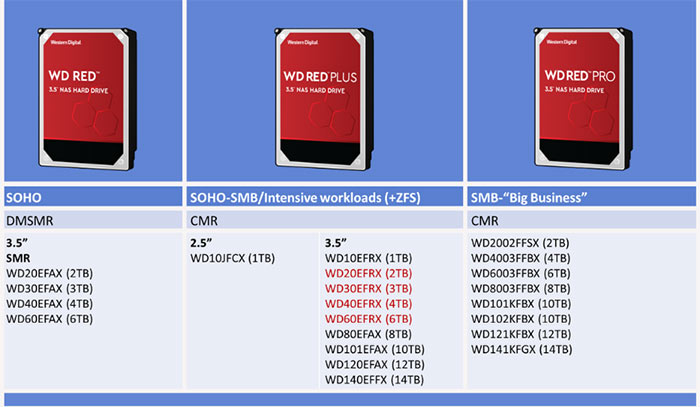Back in mid April, HEXUS covered the news that various HDD manufacturers had started introducing shingled magnetic recording (SMR) technology rather sneakily into their consumer and Soho/SMB ranges. This activity was referred to as 'submarining' by the site that unearthed it, Blocks and Files. Initial reports focussed upon the discovery that WD and Seagate both indulged in this 'submarining' of SMR products into traditionally CMR ranges, however we discovered that Toshiba also indulged in unclear product labelling/specs in this respect.
All the involved companies have been working on their promo and technical materials to make the choice between their SMR and CMR products clearer to end users. Earlier this week WD outlined its re-defining of the WD Red HDD product family, which is targeted at NAS users.
Going forwards, there will be three sub-ranges which form the WD Red HDD series, as follows:
- Our current device-managed shingled magnetic recording (DMSMR) (2TB, 3TB, 4TB, and 6TB) WD Red series will be the choice for the majority of NAS owners whose demands are lighter SOHO workloads.
- WD Red Plus is the new name for conventional magnetic recording (CMR)-based NAS drives in the WD Red family, including all capacities from 1TB to 14TB. These will be the choice for those whose applications require more write-intensive SMB workloads such as ZFS. WD Red Plus in 2TB, 3TB, 4TB and 6TB capacities will be available soon.
- Our WD Red Pro (CMR 2TB to 14TB) series for the highest-intensity usage remains the same.
The product series chart below makes the choices available even more clear. WD asserts that its DMSMR drives are still the best choice for sequential performance, both in its internal tests and in various third party benchmarks - for the price.

WD rounds off its update on this SMR/CMR NAS HDD saga by assuring readers that it is listening to both customer and partner feedback carefully. It still has confidence in the use of its DMSMR tech in many use cases, and will continue to test and work with partners to validate compatibility, performance, endurance and other factors. Whatever the case, at least it is now pretty clear which WD Red HDDs feature which hard disk recording technologies.






